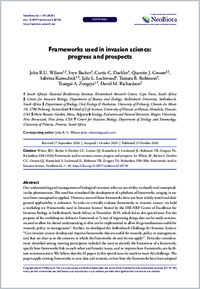Frameworks used in invasion science: progress and prospects
- Wilson, John R.U. South African National Biodiversity Institute, Kirstenbosch Research Centre, Cape Town, South Africa - Centre for Invasion Biology, Department of Botany and Zoology, Stellenbosch University, Stellenbosch, South Africa
- Bacher, Sven Department of Biology, Unit Ecology & Evolution, University of Fribourg, Chemin du Musée 10, 1700 Fribourg, Switzerland
- Daehler, Curtis C. School of Life Sciences, University of Hawaii at Manoa, Honolulu, Hawaii, USA
- Groom, Quentin J. Centre for Invasion Biology, Department of Botany and Zoology, Stellenbosch University, Stellenbosch, South Africa - Meise Botanic Garden, Meise, Belgium
- Kumschick, Sabrina South African National Biodiversity Institute, Kirstenbosch Research Centre, Cape Town, South Africa - Centre for Invasion Biology, Department of Botany and Zoology, Stellenbosch University, Stellenbosch, South Africa
- Lockwood, Julie L. Ecology, Evolution and Natural Resources, Rutgers University, New Brunswick, New Jersey, USA
- Robinson, Tamara B. Centre for Invasion Biology, Department of Botany and Zoology, Stellenbosch University, Stellenbosch, South Africa
- Zengeya, Tsungai A. South African National Biodiversity Institute, Kirstenbosch Research Centre, Cape Town, South Africa - Centre for Invasion Biology, Department of Zoology and Entomology, University of Pretoria, Pretoria, South Africa
- Richardson, David M. Centre for Invasion Biology, Department of Botany and Zoology, Stellenbosch University, Stellenbosch, South Africa
-
15.10.2020
Published in:
- NeoBiota. - 2020, vol. 62, p. 1–30
English
Our understanding and management of biological invasions relies on our ability to classify and conceptualise the phenomenon. This need has stimulated the development of a plethora of frameworks, ranging in nature from conceptual to applied. However, most of these frameworks have not been widely tested and their general applicability is unknown. In order to critically evaluate frameworks in invasion science, we held a workshop on ‘Frameworks used in Invasion Science’ hosted by the DSI-NRF Centre of Excellence for Invasion Biology in Stellenbosch, South Africa, in November 2019, which led to this special issue. For the purpose of the workshop we defined a framework as “a way of organising things that can be easily communicated to allow for shared understanding or that can be implemented to allow for generalisations useful for research, policy or management”. Further, we developed the Stellenbosch Challenge for Invasion Science: “Can invasion science develop and improve frameworks that are useful for research, policy or management, and that are clear as to the contexts in which the frameworks do and do not apply?”. Particular considerations identified among meeting participants included the need to identify the limitations of a framework, specify how frameworks link to each other and broader issues, and to improve how frameworks can facilitate communication. We believe that the 24 papers in this special issue do much to meet this challenge. The papers apply existing frameworks to new data and contexts, review how the frameworks have been adopted and used, develop useable protocols and guidelines for applying frameworks to different contexts, refine the frameworks in light of experience, integrate frameworks for new purposes, identify gaps, and develop new frameworks to address issues that are currently not adequately dealt with. Frameworks in invasion science must continue to be developed, tested as broadly as possible, revised, and retired as contexts and needs change. However, frameworks dealing with pathways of introduction, progress along the introduction-naturalisation-invasion continuum, and the assessment of impacts are being increasingly formalised and set as standards. This, we argue, is an important step as invasion science starts to mature as a discipline.
- Faculty
- Faculté des sciences et de médecine
- Department
- Département de Biologie
- Language
-
- English
- Classification
- Biological sciences
- License
-
License undefined
- Identifiers
-
- RERO DOC 329711
- DOI 10.3897/neobiota.62.58738
- Persistent URL
- https://folia.unifr.ch/unifr/documents/308931
Statistics
Document views: 196
File downloads:
- pdf: 280
